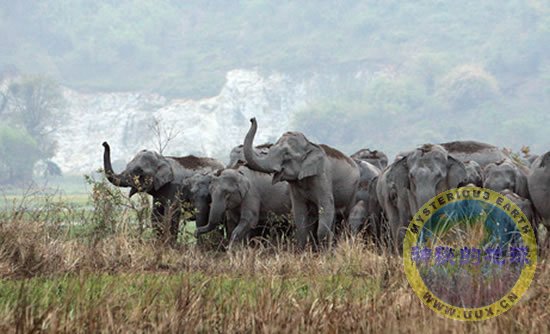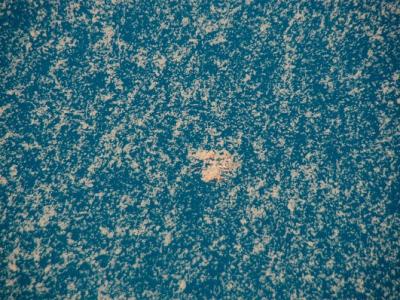World's Hottest Chili Used as Elephant Repellent
In northeastern India's Assam state wildlife experts are using a local delicacy—the Guinness Book of World Records' hottest chili—to prevent wild elephants (like those pictured in this photograph from of an Assam reserve on March 22, 2007) from harming humans or crops.
Experts say the elephants will be repelled by the smell of the bhut jolokia chilies. The animals won't ingest the chilies or be at all harmed, they say.
Similar programs have been used in south India and in Africa.
Photograph by Anupam Nath/AP
Wasbir Hussain in Gauhati, India
Associated Press
November 20, 2007
Wildlife experts in northeastern India are experimenting with a new weapon to prevent marauding elephants from destroying homes and crops—superhot chilies.
(See photos: "Ghost Chili" Scares Off Elephants)
Conservationists working on the experimental project in Assam state said they have put up jute fences made of strong vegetable fiber and smeared them with automobile grease and bhut jolokia chilies. These peppers, also known as ghost chilies, have been certified as the world's hottest by the Guinness Book of World Records.
Wildlife experts also were using smoke bombs made from the chili to keep away elephants.
(Related story: Elephant Crop Raids Foiled by Chili Peppers, Africa Project Finds [September 18, 2006])
"We fill straw nests with pungent dry chili and attach them to sticks before burning it. The fireball emits a strong pungent smell that succeeds in driving away elephants," Nandita Hazarika of the Assam Haathi (Elephant) Project told the Associated Press on Monday.
Hazarika said the elephants would not eat the chilies because the smell would be enough to repel them. He emphasized the measures would not harm the animals.
Northeast India accounts for the world's largest concentration of wild Asiatic elephants; 5,000 are estimated to live in Assam alone.
Conservationists say wild elephants increasingly attack human settlements encroaching on their natural habitat.
Satellite imagery by India's National Remote Sensing Agency shows that up to 691,880 acres (280,000 hectares) of Assam's forests were cleared between 1996 and 2000.
(Related story: Himalaya Forests Vanishing, Species May Follow, Study Says [May 30, 2006])
More than 600 people have been killed by wild elephants in Assam in the past 16 years, and villagers have reacted with an anger that has shocked conservationists.
In 2001, in the Sonitpur district, 112 miles (180 kilometers) north of the state capital of Gauhati, villagers poisoned to death 19 wild elephants that had feasted on crops and trampled houses.
"We have been forced to look for ingenious means to keep wild elephants from straying out of their habitats," M.C. Malakar, the state's chief wildlife warden, told the AP.
Copyright 2007 The Associated Press. All rights reserved. This material may not be published, broadcast, rewritten, or redistributed.












